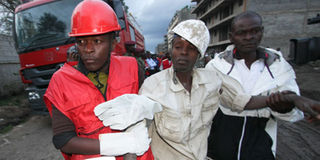Two killed as six-storey building collapses

PHOTO/TOM MARUKO/NATION
A rescue team assists one of the survivors who was trapped under debris after a six storey building under construction collapsed in Embakasi on June 14, 2011.
Two construction workers were killed and dozens believed to be trapped after a six-storey building collapsed in Nairobi’s Embakasi area.
Rescue efforts were on Tuesday night continuing to save about 14 builders trapped in the rubble.
The incident occurred at about 10.30am, causing commotion in the area. Police said at least two bodies had been pulled out of the rubble.
Up to 50 workers were believed to have been on site at the time of the collapse.
Police Commissioner Matthew Iteere said eight people had been taken to Kenyatta National Hospital with various injuries and 14 others were unaccounted for.
Some of those trapped, he said, could be heard calling for help and rescuers were trying to locate them.
He blamed the tragedy on poor construction methods and failure to follow the right procedures by contractors.
“The problem with the building is structural. My appeal is to all contractors, people who are putting up buildings in all areas of Nairobi, to adhere to the structural instructions.
“The Nairobi City Council, Department of Planning and other relevant departments must make sure buildings are built according to the required specifications,” said Mr Iteere.
National Disaster Operation Centre deputy director, Col Joseph King’ori, who was present at the scene said:
“The challenge we faced was accessing the site... the roads are narrow and not in a good state. The people in the area came directly to the operational area hindering progress”.
He added that police had to be brought in to disperse the crowd that had become unmanageable. Police used teargas and dogs to scare people away from the scene to allow rescuers to work.
“Unfortunately, Kenyans always run towards a disaster instead of running away from it. The construction was not proper as it looks like a very weak building and it just gave in to the pressure that was there.
“The composition was not good because you can see that the cement and water combination was not well done,” said Col King’ori.
Red Cross spokeswoman Nelly Muluka said that their Search and Rescue teams were trying to retrieve bodies.
Required standards
Mr Justus Malonza, a survivor, blamed construction engineers for failing to adhere to the required standards.
“I can’t know if the building was up to standard. It is the work of engineers to know that since we are just jua kali people who come to earn our daily bread with this work,” said Mr Malonza.
The 26-year-old escaped by shielding himself behind doors placed against the wall.
He had gone to fetch water at a corner of the ground floor where he was plastering walls when sand started pouring on his head. This was followed by a loud crash.
He ran for his life through an opening between a wall and the doors that shielded him from the stones.
The city is experiencing a construction boom, at a time Kenyan building companies have been criticised for flouting safety regulations.
The Architecture Association of Kenya last week issued a report, saying that 65 per cent of the country’s buildings do not meet the required standards.
Relatives of people feared trapped have gone to the site hoping to see their loved ones pulled out alive. Constructors have been accused of failing to enforce strict safety measures.
They use substandard materials and also employ poor workmanship to cut on the costs.
According to Mafundi wa Kenya Association (Mwaka) chairman George Okari, contractors and construction engineers are to blame for failing to include construction workers in the entire process therefore making other stakeholders like the Nairobi City Council unaware of on-going work.
“The fundi (construction worker) is one person who is supposed to be very integral in the construction industry. Many times you will find that he has not really been made part of the project,” said Mr Okari.




